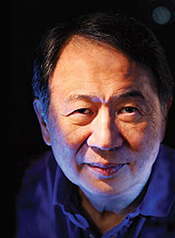Taylor Wang, Centennial Professor of Mechanical Engineering, Emeritus, has been selected as a finalist in the 2012 event “You Bring Charm to the World as an Influential Chinese.” The award ceremony is March 31 in Beijing where the winners will be announced. Wang has been provided travel to Beijing for the ceremony.
The event is co-hosted by ten major Chinese media organizations, including Phoenix Satellite Television and Phoenix New Media, China Times Media Group, Nanfang Media Group, Sina.com and Beijing Youth Daily.
The event honors Chinese who have made outstanding contributions to mankind and have attracted worldwide attention.

Wang is America’s first ethnic Chinese astronaut and flew on Challenger’s first operational Spacelab mission in April 1985.
Wang designed innovative drop dynamics experiments in zero gravity. His work drew NASA’s attention and resulted in him being chosen for the Challenger mission. He and another payload specialist were responsible for conducting 12 key scientific experiments aboard the Challenger STS-51-B space shuttle flight. His findings have been applied to his ongoing research with Harvard Medical School on “Encapsulation of Living Cells for the Functional Cure of Diabetes.”
Wang became an American citizen after immigrating to the United States from China in the early 1960s and earned three degrees at UCLA. His doctorate is in solid-state and quantum fluid physics.
He was directing a lab at the California Institute of Technology’s Jet Propulsion Laboratory in Pasadena, Calif., when picked for the seventh Challenger shuttle flight. Upon his return to Earth, Wang received many awards and recognitions, including the NASA Space Flight medal, and was recognized on Oct. 11, 1985, with “Taylor G. Wang Recognition Day” in Washington, D.C. He also addressed the United Nations General Assembly.
In 1988 Wang joined Vanderbilt as the Centennial Professor of Materials Science and Engineering and director of the Center for Microgravity Research and Applications. In 1992 and 1995, scientists aboard shuttle flights successfully carried out his experiments on compound drop dynamics in zero gravity and encapsulations for living cells, respectively.
Wang’s novel encapsulation system of living cells has practical applications in the fight against hormone-deficient diseases such as Type 1 diabetes, Parkinson’s disease and others. The encapsulated pancreatic islets can deliver insulin through nanopores without the need to use powerful immune-suppressing drugs. The treatment has proved successful in trials transplanting the cells into diabetic mice and dogs. Working with doctors and researchers at Harvard Medical School, Massachusetts General Hospital, Wang says current results with primates are equally promising.
Wang donated his papers to Vanderbilt Special Collections in 2011. He has published more than 200 journal articles, one book, and four textbook chapters and holds 28 patents.
Wang hopes researchers use his papers to help them follow their natural curiosity. “I changed my research many times,” he said. “If you follow your interest, not your training, you will have an exciting career.” Wang chose to donate his papers to Vanderbilt because of his dedication to students. “I demanded the best from my students, and they responded,” he said. “What better place to leave my lifelong work?”